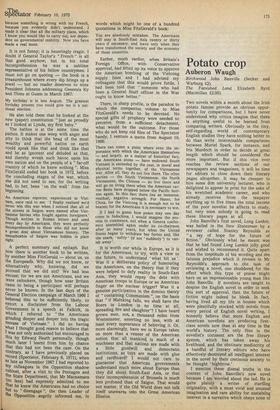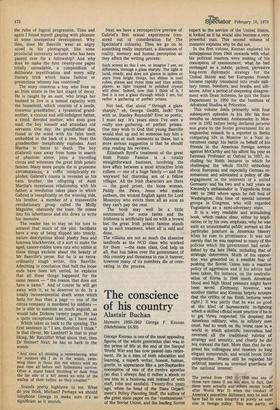Potato crop
Auberon Waugh
Birchwood John Banville (Secker and Warburg £2).
The Famished Land Elizabeth Byrd (Macmillan £2.95).
Two novels within a month about the Irish potato famine provide an obvious opportunity for comparisons, but I have never understood why critics imagine that there is anything useful to be learned from comparing writers. Obviously in the tiny, self-regarding world of contemporary English studies they have nothing better to do than write interminable comparisons between Muriel Spark, for instance, and Iris Murdoch in order to decide at great length which should be considered the more important. But if this vice ever reaches the review sections of our newspapers and magazines, it will be time for editors to close down their literary pages altogether. It may be cheaper to hire some dim university lecturer, who is delighted to appear in print for the sake of his wretched academic career, and who already receives from the taxpayer anything up to five times the total income of the poor novelist he affects to study, but very soon nobody is going to read these literary pages at all.
John Banville's first novel, Long Lankin, was hailed in the New Statesman by a reviewer called Stanley Reynolds as "a ray of hope for the future of fiction." Obviously what he meant was that he had found Long Lanhin jolly good and wished to recommend it. Quite apart from the ineptitude of his wording and the fatuous prejudice which it reveals in Mr Reynolds's approach to the task of reviewing a novel, one shuddered for the effect which this type of praise might have on an impressionable young man like John Banville. If novelists are taught to despise the English novel in order to seek this sort of approval, then the future of fiction might indeed be bleak. In fact, having lived all my life in houses which were plentifully stocked with novels from every period of English novel writing, I honestly believe that more English and American novelists are producing first
class novels now than at any time in the world's history. The only flies in the novelist's ointment are the free library system, which has taken away his livelihood, and the obstinate mediocrity of a handful of literary editors who have effectively destroyed all intelligent interest in the novel by their cretinous anxiety to be thought 'highbrow.'
I mention these dismal truths in the context of John Banville's new novel because I am worried about the lad. He is quite plainly a writer of startling originality, with a most vivid and unusual imagination and rare ability for sustaining interest in a narrative which obeys none of
the rules of logical progression. Time and again I found myself gasping with pleasure at some unexpected development. Why then, does Mr Banville wear an angry scowl in his photograph, like some provincial university lecturer who has been passed over for a fellowship? And why does he make the first twenty-one pages totally unreadable, a compendium of deliberate mystification and every silly literary trick which inane fashion or pretentious whimsy has contrived?
The story concerns a boy who lives on an Irish estate in the last stages of decay. He is taught by an aunt, who brings her bastard to live in a menial capacity with the household, which consists of a senile, timorous grandfather, a tyrannical grandmother, a cynical and self-indulgent father, a timid, devoted mother, who soon goes mad, the boy himself and attendant old servants. One day, the grandfather dies, found in the wood with his false teeth embedded in the bark of a tree. Next the grandmother inexplicably explodes. Aunt Martha is burnt to death. The boy (Gabriel) runs away from home in search of phantom sister, joins a travelling circus and witnesses the great Irish potato famine. Many more people die in gruesome circumstances; a coffin inexplicably explodes; Gabriel's cousin is revealed as his twin brother, the offspring of Aunt Martha's incestuous relationship with his father; a revolution takes place in which Gabriel is inexplicably on the winning side, his brother, a member of a transvestite revolutionary group called the Molly Maguires, obscurely the loser. He comes into his inheritance and sits down to write his memoirs.
The reader has to stay on his toes to unravel that much of the plot. Incidents have a way of being slipped into treacly, nature descriptions about plashy fens and luscious blackberries, of a sort to make the aged, cancer-ridden town rats who nibble at these things exclaim about the beauty of Mr Banville's prose. But he is an extraordinarily tough writer, this Banville. Admitting in conclusion that half the loose ends have been left untied, he explains that all these things happened for the same reason — "the reason that does not have a name." And of course he will get away with it, as he deserves to do. In a totally inconsequential death scene which lasts for less than a page — one of the circus company is murdered by soldiers — he is able to summon as much anguish, as would take Dickens twenty pages. He has a quite exceptional talent, as I have said.
Which takes us back to the opening. The first sentence is "I am, therefore I think." Is that clever, Mr Lambert? Is that to your liking, Mr Ratcliffe? What about that, then Dr Steiner? Next, he has us back to the womb:
"And since all thinking is remembering, what for instance did I do in the womb, swimming there in those dim red waters with my past time all before me? Intimations survive. Often a sound heard throbbng at dusk from the far side of a hill seems an echo of the wallop of their bellies as they coupled."
Sounds pretty highbrow to me. What do you think, Michael? Perhaps we should telephone George to make sure it's as significant as it sounds. Next we have a retrospective preview of Gabriel's first sexual experiences (censored out of consideration for The Spectator's colonels). Then we go on to something really important, a discussion of reality, memory and human perception as they affect. the writing process:
Such scenes as this I see, or imagine I see, no difference, through a glass sharply. The light is lucid, steady, and does not glance in spikes or stars from bright things, but shines in cool cubes, planes and violet lines and lines within planes, as light trapped in polished crystal will shine. Indeed, now that I think of it, I feel it is not a glass through which I see, but rather a gathering of perfect prisms.
Not bad, that about "through a glass sharply," eh, George. Geddit, Jack? You with us, Stanley Reynolds? Ever so poetic, I must say. It's years since I've seen a really nice gathering of perfect prisms. One may wish to God that young Banville would shut up and let someone buy him a Guinness at such moments as these, but a more serious suggestion is that he should stop reading his reviews.
Elizabeth Byrd's treatment of the great Irish Potato Famine is a totally straightforward business, involving the love affair between a most attractive Irish colleen — one of a huge family — and the wayward but charming son of a fellow villager. All the Irish c'haracters are there — the good priest, the loose woman, Paddy the Pawn, Jesus who makes potheen, the wicked English agent for Lord Mountjoy who evicts them all as soon as they can't pay the rent.
The book may well be a little sentimental for some tastes and the Irishness is artificially laid on with a trowel but the great Irish potato famine stands up to such treatment, when all is said and done.
The villains are not so much the absentee landlords as the NCO class who worked for them —the same class, God help us all, that has taken over the government of this country and threatens to run it forever, however many of its members die of overeating in the process.



































 Previous page
Previous page